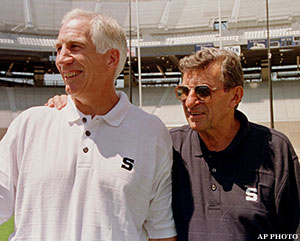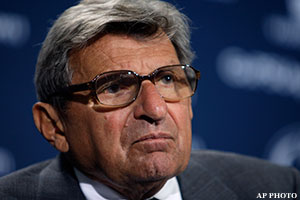Read these words carefully: Joe Paterno, in March of 2002, after being told by a graduate assistant coach that he had witnessed longtime defensive coordinator Jerry Sandusky allegedly raping a young boy in the football team's facility the night before, notified the police. In fact, Paterno discussed what he learned with the man, Gary Schultz, who had administrative control of the Penn State police.

The point people are missing is that the Penn State police are different than most campus police forces. They are a real police force. They carry guns. They aren't rent-a-cops. They have jurisdiction over the campus, which includes the Penn State football offices.
In 1953, Penn State President Milton Eisenhower (brother of Dwight D.) changed the name of the campus to "University Park," and created a separate unincorporated community within the campus. When Paterno notified Schultz of what he had been told, he was notifying an appropriate authority.
If Paterno's intention was to conceal the allegations against Sandusky from authorities, why on earth would he discuss the matter with Schultz? What motivation would Paterno have for discussing the matter with Schultz -- otherwise a completely irrelevant figure in this matter -- apart than involving the police?
The matter is not an irrelevant detail in this case, but seems to have been missed by outside observers and commentators.
I grew up in State College, Pa., went to Penn State, and was a former student and volunteer in the Second Mile foundation, Jerry Sandusky's charity. Naturally, I am not an objective commentator on this matter.
But make no mistake: I do not worship the idol of Joe Paterno, as I realize some overzealous Penn State fans do. Frankly, I wanted Paterno to retire, on his own free will or not, long before the Sandusky scandal. An 84-year-old man should not be coaching a major college football program.
The Penn State Board of Trustees rightly, in my opinion, apportioned him his share of accountability for this scandal. When something goes horribly wrong under the purview of leaders, the leaders should be held accountable, even though they may not be directly at fault. This is something many Penn Staters have failed to understand.

For example, when a series of articles in 2007 found appalling conditions at the Walter Reed Medical Center, where wounded soldiers and Marines were being treated after returning from Iraq and Afghanistan, Army Secretary Francis J. Harvey was held accountable, and was forced to resign. Did anyone hold Harvey directly responsible for this matter? No, but as the Army's leader, he was accountable for what happened under his watch.
However, accountability does not equal responsibility. Paterno is in no way responsible any of the assaults alleged to have been perpetrated by Sandusky.
The truth is that there isn't much more Joe Paterno could have done to prevent the alleged assaults that happened after March of 2002. I have no doubt that there are points along the eight-year timeline of this scandal where Paterno could have, and should have, acted differently -- Paterno himself has acknowledged as such. But nobody bats 1.000 in these situations. Those who have had a friend commit suicide likely know this.
The question is did Joe Paterno act in good faith, especially in March of 2002? Yes, Joe Paterno did. Paterno's actions were generally in line with how most reasonable people would act if put in the same situation.
Paterno could not have made a citizen's arrest. At some point in 2002, Paterno was likely told that there would be no further action against Sandusky; after that point, Paterno appears to have ended association with his longtime friend and assistant.
Perhaps aware of this, prosecutors leaked to the Harrisburg Patriot-News that they were more than satisfied with Paterno's response to the tip shortly after Sandusky was indicted. However, it is almost certain that Paterno was asked not to speak to the press by prosecutors and Penn State University, so he could do little in the weeks following the indictment to defend himself from allegations that he "covered up" the abuses.
And did they come. The Washington Post's Mike Wise implied that Paterno hid Sandusky's behavior to avoid losing "recruits, and by association, money and prestige." The Nation's Dave Zirin titled his response to the indictment, "College Football's Logic: Why Joe Paterno and Penn State Would Shield a Child Molester." Fox Sports blogger Brooks Melchior tweeted on Nov. 17 that, "To ignore Paterno is to ignore the victims. Remember, many wouldn't exist w/ out him." Even with the benefit of time to evaluate the facts and calm down, some commentators have continued the assault on Paterno. CBS Chicago commentator Dan Bernstein celebrated this week that "Paterno is almost dead, thankfully."
Indeed Paterno is almost certainly living the last years, perhaps months, of his historic life. I fear we don't have much time to properly honor Paterno.
I'm not trying to blame the media boogeyman here. I too was a bit disappointed in Paterno immediately after Sandusky was indicted. I never imagined something like this could happen under his watch.
But with time I have come to understand Paterno's actions. Joe Paterno is a good man who does not deserve to have his legacy destroyed by commentators who at best don't understand important details, or at worst are in over their intellectual depth.
Before we say goodbye to Paterno, let's rationally reassess his legacy, and explore why exactly we rushed to an uninformed judgment of this man.
-- Thomas L. Day is a 2003 graduate of Penn State University, a native of State College, Pa., and a former student and volunteer in the Second Mile program. His November op-ed, "Penn State: My final loss of faith," was the Washington Post's second-most widely shared article in 2011. To contact Thomas Day, click here.







